Principles of Economic Liberty: The Biblical Case for Free Enterprise
A Six-Session Bible Study Series Based on the Word Foundations Series of Articles Titled “The Bible and Free Enterprise”
“The Bible and Free Enterprise” is a Word Foundations series of articles that makes the case that the free enterprise economic model, or capitalism, is biblical. While free enterprise can be distorted and abused, the distortions are departures from biblical principles and a biblical worldview. Now more than ever, Christians must understand and be able to articulate that free enterprise, or capitalism, is rooted in biblical teachings and fosters qualities the Scripture commends. Not convinced? In this six-session series, you’ll encounter overwhelming evidence. The Bible is not silent about economic freedom!
Session 4
INDIVIDUAL CHOICE
A people… who are possessed of the spirit of commerce, who see and who will pursue their advantages may achieve almost anything.
—George Washington—
The principles covered in this session are highlighted in part 2 of “The Bible and Free Enterprise.”
Begin by reminding participants that you’re traveling together on a journey to explore ways that capitalism, or the free enterprise economic model of financial exchange, aligns with biblical teachings. Say: Our journey is placing ten principles before us. These tenets have been derived heavily, but not exclusively, from a paragraph appearing in an article by Dr. Ronald Nash affirming capitalism as biblical.
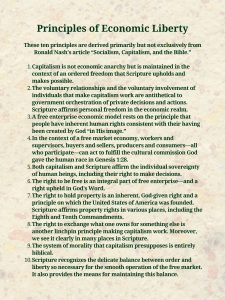
A PDF file of the above graphic is available here. A PDF file of an overview of the Bible study series is available here.
During this session we will examine principles 5 & 6 on our list.
-
-
- Both capitalism and Scripture affirm the individual sovereignty of human beings, including their right to make decisions.
- The right to be free is an integral part of free enterprise—and a right upheld in God’s Word.
-
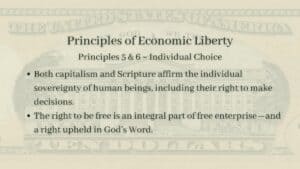
Remind participants that in this session you are covering the first two of the four inherent rights that Ronald Nash specifically names in his paragraph describing capitalism.
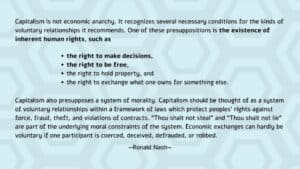
Principle Five
Both capitalism and Scripture affirm the individual sovereignty of human beings, including their right to make decisions.
Begin your discussion of the fifth principle by emphasizing the truth that the free enterprise economic model puts the individual in the driver’s seat. This is true whether the individual is a producer or a consumer.
To drive home the point, play these three clips from the second of a series of three videos from Main Street Economics. Each clip is only about 30 seconds long. Background information: All three Main Street Economic videos, as well as a few other videos and articles, are available here.
Clip 1
 You’ve heard of a little company called Apple Computer, right? Steve Jobs built the first Apple computer out of his garage back in 1976. And today, Apple is one of the most profitable companies in the world. It was the free enterprise system that allowed him the freedom to start his company. By seeking investors who wanted to make money, Jobs gambled and won, creating great wealth for himself, his employees, and stockholders.
You’ve heard of a little company called Apple Computer, right? Steve Jobs built the first Apple computer out of his garage back in 1976. And today, Apple is one of the most profitable companies in the world. It was the free enterprise system that allowed him the freedom to start his company. By seeking investors who wanted to make money, Jobs gambled and won, creating great wealth for himself, his employees, and stockholders.
Ask and discuss:
-
- What are some of the risks Jobs took when he launched Apple?
- What other people have benefitted from Steve Jobs’s innovative and creative work? How have they benefitted?
- In addition to becoming wealthy, how was Jobs rewarded? Discuss the importance of rewards like personal satisfaction and pleasure derived from helping others.
- Say: Freedom to make decisions means freedom to chart your own path within the limits of reality and the law, and it means the freedom to succeed, as it did in Steve Jobs’s case. But it also means having the freedom to fail. Some consider the possibility of failure to be a flaw in the free enterprise system, so they therefore believe that government should “pad” this element and make failure less of a possibility. Ask: If government did this (or when government does this), how is the possibility of success minimized as well? Point out that one way success can be minimized is that if an individual has the assurance that government will step in and cover for his (or her) failure, this could influence him to take more foolish risks. Thus, the possibility of failure sharpens the decisions that determine what risks are taken and how extreme, wise, or unwise they may be. Summarize: Eliminating the freedom to fail necessarily means curtailing or even eliminating the freedom to succeed.
Clip 2
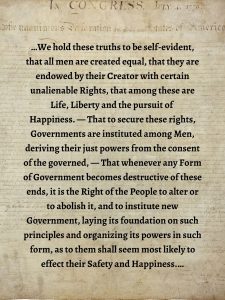 If Steve Jobs had lived under socialism, Apple and its amazing products would not exist. Jobs became rich by working hard, coming up with great products at affordable prices. This is all based on the American ideal of the pursuit of happiness, which happens to be in our Declaration of Independence. Competition, innovation, and the pursuit of profits are all at the heart of a free society, and that’s what motivates people to do incredible things.
If Steve Jobs had lived under socialism, Apple and its amazing products would not exist. Jobs became rich by working hard, coming up with great products at affordable prices. This is all based on the American ideal of the pursuit of happiness, which happens to be in our Declaration of Independence. Competition, innovation, and the pursuit of profits are all at the heart of a free society, and that’s what motivates people to do incredible things.
Ask and discuss:
-
- The speaker states, “Competition, innovation, and the pursuit of profits are all at the heart of a free society, and that’s what motivates people to do incredible things.”
- If competition were eliminated, how would freedoms be curtailed for the seller? for the buyer?
- How would the people’s motivation to do incredible things be affected? How does innovation enhance, maximize, and broaden freedom?
- What specific freedoms must a. person have to innovate to his or her fullest potential?
- How does the freedom to pursue profits influence a producer’s/seller’s decisions?
- How does a desire to profit from one’s productive work benefit others, even people the individual who is working to produce a profit might not place at the top of his or her list to help or benefit? In other words, how are people operating in the free enterprise motivated to make decisions that benefit others, not just oneself?
- While a person’s “life does not consist in the abundance of the things he possesses,” (Luke 12:15), much satisfaction and happiness can rightly be derived from owning material goods, working hard to increase one’s wealth, and exercising wise management of one’s possessions. Remember the cultural commission and its ties to God’s having created human beings in His own image (see Gen. 1:26-28). Also see Proverbs 12:24, 22:29; Luke 19:11-27; Acts 16:11-15; Ephesians 4:28; 1 Timothy 6:17-19. These passages are available on an online page here and as a PDF file here.
- Why is having the right to make decisions regarding owning and managing property necessary for one’s happiness? Part of the answer is that without the right to own and manage property, people essentially belong to the government and are its slaves. Another point is that property rights mean personal freedom, and not having property rights means having no freedom. (Property rights is the theme for our next session.) Yet, a growing number of influential people and forces today see no connections between property rights, freedom, and happiness. Note this from this video produced by the World Economic Forum (WEF). These elites are telling everyone that in 2030, “You’ll own nothing. And you’ll be happy.” This is a lie and a hard push toward socialism! Mark it down: The threat to property rights is a threat to one’s ability to pursue happiness.
- The speaker states, “Competition, innovation, and the pursuit of profits are all at the heart of a free society, and that’s what motivates people to do incredible things.”
Background information: Watch this video! In it, speaker and author Douglas Kurger explains the danger the WEF’s narrative and their efforts to make it a reality.
The threat to property rights is a threat to one’s ability to pursue happiness.
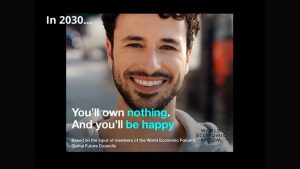
Without the right to own and manage property, people belong to the government and are its slaves. They have no freedom.
Clip 3

Free market systems offer the incentive we need, because we can enjoy the fruits of our labor. History clearly shows that the more a country embraces economic freedom and free markets, the more prosperous it becomes. Simply put, economic freedom is the answer to socialism, because it recognizes individual rights, respects them, and allows people to take charge of their own lives and lift themselves up. If you really think about it, it really all boils down to common sense.
Ask and discuss:
-
- Describe the experience of enjoying the fruits of one’s own labor.
- Describe how engaging in honest and productive work because one has chosen to do so can enhance a person’s
- confidence
- self-respect
- sense of gratitude
- sense of humility
- sense of responsibility
- ability to be sensitive to others’ needs
- ability to help others in need
- Of course, everyone engaging in productive work must guard against pride, selfishness, and greed — but having the freedom to work and accumulate wealth is not the cause of greed. Actually, it is motivation to act act wisely and responsibly to better oneself those he or she loves. It is motivation to make decisions that benefit others.
- Note that the speaker in the clip said: “Economic freedom…recognizes individual rights, respects them, and allows people to take charge of their own lives and lift themselves up.” This sentiment is consistent with Paul’s admonition to the Thessalonian Christians (and all believers) in 1 Thessalonians 4:10-12: 4:10 “But we urge you, brethren, that you increase more and more; 11 that you also aspire to lead a quiet life, to mind your own business, and to work with your own hands, as we commanded you, 12 that you may walk properly toward those who are outside, and that you may lack nothing.”
Having the Right to Make Decisions Means You Are the One in Charge
In part 2 of “The Bible and Free Enterprise,” when we were considering the voluntary relationships highlighted in the second principle, we said something about human sovereignty and freedom that applies to the fifth principle. Here’s what we said,
Have you stopped to consider [the] freedom [capitalism offers you] and what your life would be like without it? How valuable is this freedom to you? No, you can’t do absolutely everything you may want to do. Certain limitations, such as not having enough money to buy your first-choice car or computer, prevent you from taking first-choice actions. Yet within the free market economy, you are the one in charge! You can work to reduce your limitations! One day, that car won’t be so far out of reach!
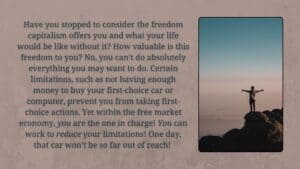
Biblical Examples Poor Choices
The Bible is replete with examples of people who increased their wealth and made decisions to exchange both tangible and intangible assets. People acted of their own free wills, though not always wisely. Even when they chose poorly, their sovereignty — their right to make the decisions they made — still was recognized.
-
-
- Even Jesus Himself recognized the right of the rich young ruler to walk away from Him in favor of his possessions (see Luke 18:18-23). By the way, Jesus knew this man was idolizing his possessions and gave him specific instructions to give them away and follow Him; He did not give these instructions to His disciples generally (see pages 3 and 4 of this publication).
- In a parable, Jesus also warned about holding onto possessions too tightly. He said a man accumulated so many crops (and so much wealth) he decided he would have to tear down his barns and build bigger ones to store it all — but the man gave no thought to his accountability to God. How foolish he was! (See Luke 12:13-21.)
-
The free enterprise system does not affirm one’s right to make illegal decisions, but it does affirm a person’s right to make foolish ones. This is part of the fabric of the free enterprise system. Let’s first consider a couple of additional examples where people made poor choices, yet their desires and decisions still were honored. These are from the Old Testament. While the details of these decisions are provided in the Scripture passages below, you can provide a fairly quick summary of the choices made.
Esau
Genesis 25:29-33 tells us,
29 Now Jacob cooked a stew; and Esau came in from the field, and he was weary. 30 And Esau said to Jacob, “Please feed me with that same red stew, for I am weary.” Therefore his name was called Edom.
31 But Jacob said, “Sell me your birthright as of this day.”
32 And Esau said, “Look, I am about to die; so what is this birthright to me?”
33 Then Jacob said, “Swear to me as of this day.”
So he swore to him, and sold his birthright to Jacob.
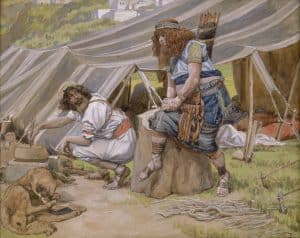
Observe that while the free enterprise system honors human sovereignty, those who are willing to control their urges and wait (upholding the principle of delayed gratification) benefit the most. Unfortunately, credit buying tends to exacerbate the urge to have whatever we want immediately rather than waiting for it. Here are several Bible passages that commend, or are consistent with, the ideal of delayed gratification, or controlling urges that scream to be satisfied immediately. See Proverbs 6:6-11; Romans 12:1-2; Galatians 5:13; Galatians 5:16; Hebrews 13:4; Hebrews 11:24-26; and James 1:19. If you can’t review all of these passages ask for a volunteer to read Hebrews 11:24-26. Discuss delayed gratification in light of the phrase “the passing pleasures of sin.” Not everything a person might desire to have now necessarily is sinful, but feeding the desire to “get it now” often is a doorway to sinful desires and actions.
Joseph’s Brothers
Genesis 37:23-28 relates the sale of Joseph by his brothers to Midianite traders.
23 So it came to pass, when Joseph had come to his brothers, that they stripped Joseph of his tunic, the tunic of many colors that was on him. 24 Then they took him and cast him into a pit. And the pit was empty; there was no water in it.
25 And they sat down to eat a meal. Then they lifted their eyes and looked, and there was a company of Ishmaelites, coming from Gilead with their camels, bearing spices, balm, and myrrh, on their way to carry them down to Egypt. 26 So Judah said to his brothers, “What profit is there if we kill our brother and conceal his blood? 27 Come and let us sell him to the Ishmaelites, and let not our hand be upon him, for he is our brother and our flesh.” And his brothers listened. 28 Then Midianite traders passed by; so the brothers pulled Joseph up and lifted him out of the pit, and sold him to the Ishmaelites for twenty shekels of silver. And they took Joseph to Egypt.
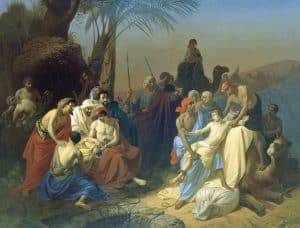
God used this situation, as well as other difficult circumstances Joseph experienced, to eventually put him in a position of high authority (second in command) in Egypt. There Joseph was able to “save many people alive” because of his wise planning, administrative skill, and faith in God, who revealed to him important information that helped him and all Egypt prepare wisely for the future. Although he rose to a position from which he could have exacted revenge against his brothers, Joseph was humble and
Genesis 50:19 said to them, “Do not be afraid, for am I in the place of God? 20 But as for you, you meant evil against me; but God meant it for good, in order to bring it about as it is this day, to save many people alive. 21 Now therefore, do not be afraid; I will provide for you and your little ones.” And he comforted them and spoke kindly to them.
Fortunately, for well over 150 years in the United States it has been illegal to own, buy, or sell human beings as property.
Joseph Acts Wisely to Save Many Lives
When God revealed to Pharaoh through Joseph’s accurate interpretation of his dreams that Egypt would experience seven years of plenty followed by seven years of severe famine, Pharaoh elevated Joseph to second in command in Egypt.
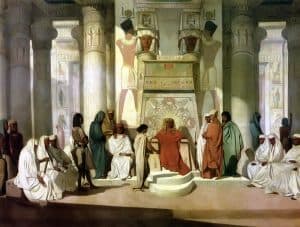
During the years of plenty, Joseph arranged for the excess grain to be stored. Then, when the famine hit, grain was available, and no one had to starve. Here is Genesis 41:53-57:
53 Then the seven years of plenty which were in the land of Egypt ended, 54 and the seven years of famine began to come, as Joseph had said. The famine was in all lands, but in all the land of Egypt there was bread. 55 So when all the land of Egypt was famished, the people cried to Pharaoh for bread. Then Pharaoh said to all the Egyptians, “Go to Joseph; whatever he says to you, do.” 56 The famine was over all the face of the earth, and Joseph opened all the storehouses and sold to the Egyptians. And the famine became severe in the land of Egypt. 57 So all countries came to Joseph in Egypt to buy grain, because the famine was severe in all lands.
Later, in Genesis 47:13-26, we see that
13 there was no bread in all the land; for the famine was very severe, so that the land of Egypt and the land of Canaan languished because of the famine. 14 And Joseph gathered up all the money that was found in the land of Egypt and in the land of Canaan, for the grain which they bought; and Joseph brought the money into Pharaoh’s house.
15 So when the money failed in the land of Egypt and in the land of Canaan, all the Egyptians came to Joseph and said, “Give us bread, for why should we die in your presence? For the money has failed.”
16 Then Joseph said, “Give your livestock, and I will give you bread for your livestock, if the money is gone.” 17 So they brought their livestock to Joseph, and Joseph gave them bread in exchange for the horses, the flocks, the cattle of the herds, and for the donkeys. Thus he fed them with bread in exchange for all their livestock that year.
18 When that year had ended, they came to him the next year and said to him, “We will not hide from my lord that our money is gone; my lord also has our herds of livestock. There is nothing left in the sight of my lord but our bodies and our lands. 19 Why should we die before your eyes, both we and our land? Buy us and our land for bread, and we and our land will be servants of Pharaoh; give us seed, that we may live and not die, that the land may not be desolate.”
20 Then Joseph bought all the land of Egypt for Pharaoh; for every man of the Egyptians sold his field, because the famine was severe upon them. So the land became Pharaoh’s. 21 And as for the people, he moved them into the cities, from one end of the borders of Egypt to the other end. 22 Only the land of the priests he did not buy; for the priests had rations allotted to them by Pharaoh, and they ate their rations which Pharaoh gave them; therefore they did not sell their lands.
23 Then Joseph said to the people, “Indeed I have bought you and your land this day for Pharaoh. Look, here is seed for you, and you shall sow the land. 24 And it shall come to pass in the harvest that you shall give one-fifth to Pharaoh. Four-fifths shall be your own, as seed for the field and for your food, for those of your households and as food for your little ones.”
25 So they said, “You have saved our lives; let us find favor in the sight of my lord, and we will be Pharaoh’s servants.” 26 And Joseph made it a law over the land of Egypt to this day, that Pharaoh should have one-fifth, except for the land of the priests only, which did not become Pharaoh’s.
In Genesis 41:53-57 and Genesis 47:13-26 we see a number of words and phrases that describe or imply transactions, financial and otherwise, took place.
Distribute this worksheet to each participant and ask your class members to circle those words and phrases. On this page, these words and phrases are highlighted in bold type (also go here).
If time allows, you might consider delving into the matter of government’s involvement in meeting people’s needs. Note that at the height of the famine, Joseph didn’t simply give grain to individuals and families. He sold it or negotiated something in exchange for it. Unfortunately, Americans have come to expect the government to give them what they want and need. The truth is that government doesn’t give anything. In 20th– and 21st– century America, when the government has “given” money or other resources to its citizens, it actually has put a price tag on what it has “given.” Joseph did this, but the difference is that Joseph was up-front about what he was expecting in exchange for the grain the people needed. American politicians haven’t been up-front or truthful. Had they been, scenarios like this would have unfolded: You are in need. The state sees that and wants to help. We’ve arranged for you to have the food and funds you need, and we won’t charge you anything. They’re “free.” But here’s the catch. When you decide to take the government up on its offer, you become the property of the state. This is effectively what has happened, and it’s a form of slavery. In fact, welfare has done untold harm to the black community; it has devastated the black family as slavery never did (as horrific as slavery was). Yet blacks aren’t the only ones affected. Everyone who has bought into government lies about “all the wonderful things the government can do for you” has been affected.
When you accept “free” government assistance, you effectively become the property of the state.
Returning to the matter of Joseph’s wise leadership, after briefly discussing participants’ responses to their worksheets, emphasize that the free market system honors the right of buyers, sellers, and all who participate in it to make their own decisions. While some (including all of us) make foolish decisions at times, they themselves must bear responsibility for those decisions and actions. Consider too that a great many wise decisions are made. They benefit not only the one making them, but others as well. The blessing of capitalism is that the right of making individual decisions is upheld and affirmed. Freedom is priceless! Don’t take it for granted.
Principle Six
The right to be free is an integral part of free enterprise—and a right upheld in God’s Word.
Emphasize something you’ve stated already — that even though the right to make decisions and the right to be free are upheld by the free enterprise system and by God’s Word, this does not mean that the free market or Scripture is neutral about unwise decisions and poor choices. Say: Both encourage wise decisions. Capitalism does this through its natural rewards of good behavior and good choices, and Scripture especially does in clear and explicit ways.
Distribute this worksheet to participants. (Go here for the Bible passages online.) Give participants a few minutes to read the passages and respond to the instructions given. After a few minutes have passed, lead a brief discussion, allowing volunteers to share their responses.
Emphasize the principle we see in 2 Thessalonians 3:10: “For even when we were with you, we commanded you this: If anyone will not work, neither shall he eat.”
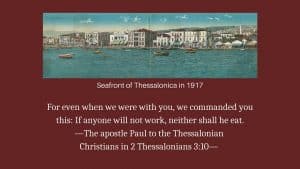
Ask:
-
-
- Is this harsh? Why or why not?
- What are the benefits and potential benefits of having and enforcing this policy?
- What are the costs and potential costs of not having and enforcing it?
- Point out that many today would say it is lacking in compassion, but how compassionate would it be to reward laziness?
- Note that Paul did not say “If anyone cannot work…” but “If anyone will not work” (emphasis added).
-
Explain that Jesus’ teachings assume a free enterprise market economy. Divide the large group into six smaller groups. Give each one one of these assignments. (Go here for the Bible passages online.) Give groups a few minutes to discuss their assigned passage(s) and to respond to the questions at the bottom of their assignment sheet. Ask each group to appoint a willing spokesperson to report the group’s findings.
After Group 6 has reported (or during the report Group 6 gives), share this graphic, which showcases Matthew 20:15.
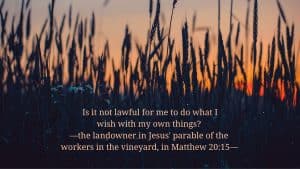
Briefly discuss the implications of this statement with regard to God’s perspective on economic systems. (The members of Group 6 may have covered some of these items in their report.)
-
-
- Private property is affirmed.
- Management of private property is affirmed.
- Personal choice is affirmed.
- Government’s role of protecting rights is affirmed.
-
Close in prayer: Father, thank you for the freedom to make individual choices within the free market system. We ask you to help us make wise decisions. We pray the free enterprise system will be preserved in America, and that people who currently misunderstand it and other economic systems will come to see that capitalism upholds freedom and socialism eliminates it. In Jesus’ name. Amen.
Leave this quote from John Adams with the members of your group:
Liberty must at all hazards be supported. We have a right to it, derived from our Maker. But if we had not, our fathers have earned and bought it for us, at the expense of their ease, their estates, their pleasure, and their blood.
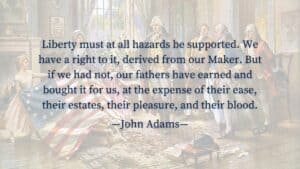
Looking Ahead
Session 5 will explore the theme of property rights by examining principles 7 & 8. These tenets are highlighted in part 3 of the series “The Bible and Free Enterprise.” They also are the third and fourth rights Ronald Nash specifically names in his paragraph describing capitalism.
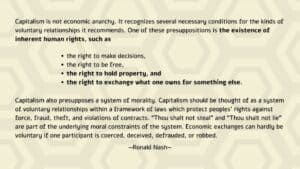
-
-
- The right to hold property is an inherent, God-given right and a principle on which the United States of America was founded. Scripture affirms property rights in various places, including the Eighth and Tenth Commandments.
- The right to exchange what one owns for something else is another linchpin principle making capitalism work. Moreover, we see it clearly in many places in Scripture.
-
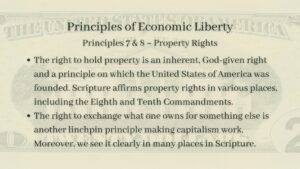
-
-
- Session 5 is available here.
- List of Principles of Economic Liberty
- Principles of Economic Liberty Bible Study Home Page
-
Copyright © 2021 by B. Nathaniel Sullivan. All rights reserved.
For further study: Rendering Unto Caesar: Was Jesus A Socialist? This excellent resource from, FEE, the Foundation for Economic Education, is available here. The author of Rendering Unto Caesar: Was Jesus A Socialist?, Lawrence W. Reed, wrote, “[O]ne can scour the Scriptures with a fine-tooth comb and find nary a word from Jesus that endorses the forcible redistribution of wealth by political authorities. None, period.”
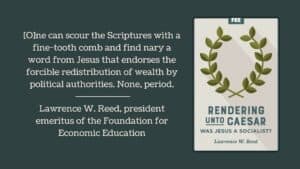
top image credit: Photo by Franki Chamaki on Unsplash
Unless otherwise indicated, Scripture has been taken from the New King James Version®. Copyright © 1982 by Thomas Nelson, Inc. Used by permission. All rights reserved.
